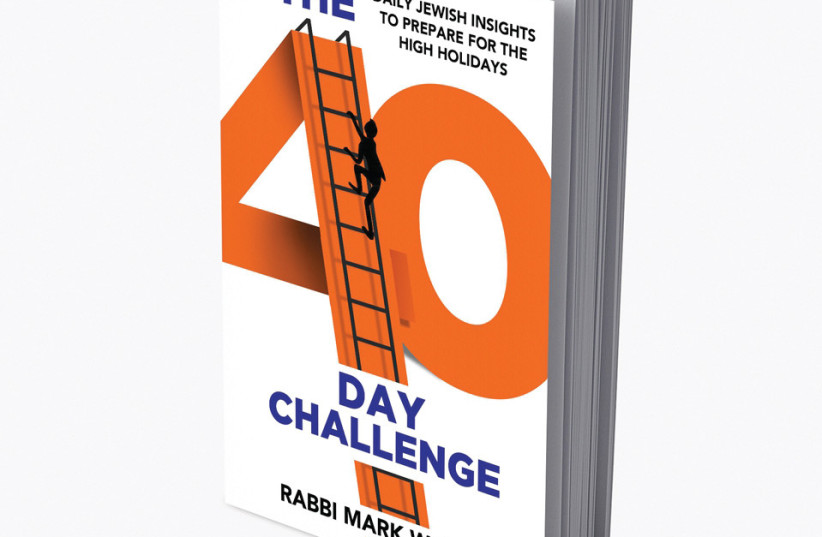Not satisfied with preaching to the choir, Rabbi Mark Wildes founded Manhattan Jewish Experience in New York City in 1998 with a goal of reaching the unaffiliated.
As his late mother Ruth always encouraged him to bring singles to his Shabbos table, he wanted to create a space that would have something for everyone. MJE’s programs reach out to Jewish professionals in their 20s and 30s who are less affiliated, with one-on-one learning, Cocktails on the Roof, Happy Hours at bars, Purim parties, Shabbat (High Holy Day and all holiday) services, Friday night dinners, speakers, Stump the Rabbi, summer trips to Israel, Met or Yankee baseball games and participation in the Israeli Day Parade on 5th Avenue to name a few.
Wildes wanted MJE to be especially inviting to singles – resulting in a sea-splitting 344 marriages. The director of MJE became an author with Beyond The Instant and his new book from Kodesh Press is called The 40 Day Challenge: Daily Jewish Insights To Prepare For The High Holidays. It cites everyone from Tom Brady to the Rambam and while especially important now, contains lessons that can be used all year round.
Why did you decide to write this book?
It started as a WhatsApp group and grew during the pandemic. There were people starving to spiritually grow and not be alone and first someone suggested that it be an actual book and then someone suggested that it include at least a ritual a day to perform to prepare for the High Holy Days. Some could be easier, some could be harder. But the point was to not just “show up” for the High Holy Days but to be really ready both in mind and spirit. We even had a book cover contest, which I think was great, with a person going up a ladder because every year we face challenges. Some look familiar and others are new. Either way, we have to surmount them and not remain stagnant.
In one chapter, you advise people to play the ball and not the man; what do you mean by that?
It’s a term for a basketball strategy for defense, but really, it means to focus on the real issue. Don’t get distracted by the fact that a person might have different political or religious views. Reduce it like a sauce when cooking. Does the person have a point? Is there a basis to what the person is saying? If so, great, don’t fall for any head-fakes, just go right to the issue at hand and measure its validity or lack thereof.
What is your secret to making 344 marriages?
It’s my organization, not only me, but here is the thing. People will say they don’t want to be at a meat market. By that, I think they mean tons of people and music blaring with little real connectivity. I think here, you are meeting people dressed in Purim costumes, at a ski trip, on maybe their first trip to Israel, seeing a woman shoot a rifle and learning about the history of the Holy Land, or laughing at a comedian, or stamping your feet along with a good musician, or hearing an illuminating speaker. I think all singles feel the pressure of meeting someone. We try to reduce the pressure, so having a good time or learning something or enjoying something is the cake, and meeting your possible bashert is the icing. We’re 344 and strong.
Do you think it will surprise readers that some of the greatest rabbis had anger issues – and that was before social media?
Rabbis are human. Any person with high expectations will be angry when those expectations are not met. Abraham Lincoln had high expectations. He was angry when he failed. He’d write letters but never send them. Rather than express anger outwardly, he realized we must creatively channel it into solutions, analyze why a specific action did not succeed and then tweak it so that it works next time.
What’s your favorite story you tell in the book and why?
It’s a bit grim but the most fitting. Before the Holocaust, Yankel, a middle-aged man who used to have a Crown Heights bakery, found himself with an older man. They were on the box cars on the way to Auschwitz and Yankel recognized this older man, who was shivering, from his town. Yankel wrapped his arms around him and began to warm his arms, his neck and his face. “Somehow I kept the old man warm, but I was exhausted and I myself was freezing. My fingers were numb, but I didn’t stop rubbing heat unto this man’s body.” When he woke up, all the bodies on the train were frozen stiff other than the older man and himself. One of the secrets of Judaism is when you warm another person, you warm yourself.

The 40 Day Challenge is published by Kodesh Press and also available on Amazon.
